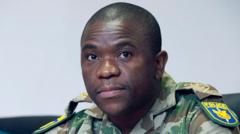Despite a bruising encounter with Donald Trump that revived tensions about race in South Africa, President Ramaphosa's composed response may strengthen his domestic standing amid political upheaval and criticism.**
Ramaphosa's Resilience: Navigating the Storm of U.S.-South Africa Diplomacy**

Ramaphosa's Resilience: Navigating the Storm of U.S.-South Africa Diplomacy**
South Africa's President Cyril Ramaphosa faces domestic scrutiny after a contentious meeting with Trump but could turn challenges into political capital at home.**
South Africa's President Cyril Ramaphosa recently faced an unexpected diplomatic confrontation with U.S. President Donald Trump, which unfolded in a tumultuous Oval Office meeting that garnered global attention. Initially, Ramaphosa's trip to Washington was meant to foster bilateral relations and secure economic support, but it devolved into a public relations tussle that highlighted Trump's unfounded allegations of white genocide in South Africa.
In the face of Trump's hostile rhetoric, many observers have commended Ramaphosa for maintaining composure and diplomacy under pressure. Yet, critics back home argue that he should have been more assertive in countering the misinformation propagated by the U.S. President. Upon returning to South Africa, Ramaphosa is greeted with a host of challenges, including a coalition government strained by intra-party conflicts, rising crime rates, high unemployment, and the burden of public service failures.
The politicized environment is compounded by the splintering support for the ruling African National Congress (ANC), as factions within the party vie for influence ahead of the 2027 electoral conference. Opponents of Ramaphosa, like Economic Freedom Fighters (EFF) leader Julius Malema, have intensified their critiques, further complicating his leadership position.
Despite these hurdles, Ramaphosa is acutely aware of the urgent need for increased U.S. investment to stimulate the South African economy, which relies heavily on initiatives like the African Growth and Opportunity Act (AGOA). The meeting with Trump may have highlighted his diplomatic credentials and past successes, reminding South Africans that he played a crucial role in overcoming apartheid and maintaining stability during tumultuous periods.
Political analysts have noted a potential upswing in Ramaphosa's public image due to his handling of the Trump meeting. Some assert that he could emerge from the confrontation with a renewed sense of authority, enhancing the credibility of his government of national unity (GNU). The cooperation demonstrated by diverse political figures in the Oval Office could be perceived as a robust response to external challenges, presenting a united front that resonates with South African citizens.
While the aftermath of this international debacle remains to be fully realized, many believe that the narrative surrounding Ramaphosa's composure under fire could foster greater stability within the GNU and propel him to political resilience amid internal dissatisfaction.
As South Africa grapples with myriad socio-economic issues, the Long-standing query of" who could replace Ramaphosa?" seems to persist. His ability to diffuse tension, coupled with his historical significance in the nation's evolution, may secure his position for the time being. Conversely, the political scene remains fragmented, and figures such as Malema and others on the fringes will seek to capitalize on any discontent as South Africa's political landscape remains just as uncertain as ever.























